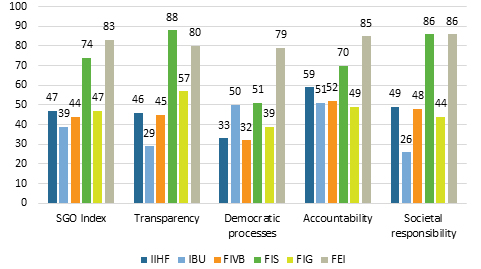Progress in sports governance is measurable, but slow
The increased public and political pressure on international sports federations is leaving its mark on their governance standards. But progress comes much too slowly, and most federations are still governed in a way that is far from satisfying.
A new survey – Sports Governance Observer 2019 – follows up on the benchmarking carried out by Play the Game in 2015 and 2018. Whereas the 2015 survey showed that a vast majority of the 35 Olympic federations were unable to meet the most basic governance standards, there are signs of improvement.
Analyst Jens Alm from Play the Game has applied the Sports Governance Observer tool on six international federations in 2019: the Fédération Equestre Internationale (FEI), the International Gymnastics Federation (FIG), the International Ski Federation (FIS), the Fédération Internationale de Volleyball (FIVB), the International Biathlon Union (IBU), and the International Ice Hockey Federation (IIHF).
The 2019 results once again show a great variation in governance standards with a vast difference between top and bottom.
Figure 1: Scores of the six surveyed international federations in SGO 2019 on the SGO index and dimensions (pct.)

The figure demonstrates that FEI (equestrian sport) achieves the highest SGO index score and performs best among the six federations on the dimensions of democratic processes and internal accountability and control, and together with FIS (ski) they achieve the highest score on the dimension of societal responsibility. In transparency, FIS achieves the highest score.
IBU (biathlon) achieves the lowest SGO index score and has the lowest score within transparency and societal responsibility, while FIVB (volleyball) achieves the lowest score on the democratic process dimension. FIG (gymnastics) has the lowest score on internal accountability and control.
It should be noted in all fairness that the IBU following criminal investigations and exchange of the top leadership in the spring of 2018, has embarked on a reform process that was not yet completed by the time of the SGO benchmarking.
“Following decades of scandals, it is good to see that serious reforms now do take place in some sports. But with all the attention the Olympic movement claims it is paying to improve governance and prevent corruption, it is disappointing that our surveys in 2018 and 2019 together show that only three out of the 11 federations we studied, can reach a score of 50%” says Jens Sejer Andersen, international director of Play the Game.
“This is the more serious, as we have only benchmarked the rules and regulations on paper, and not the real behaviour of the international federations. Those federations that cannot even get their paperwork right, are not the most trustworthy when it comes to securing better governance in practice.”
Further reading
·Download the Sports Governance Observer 2019 report
·Read more about the main findings of the 2018 survey
·Download the Sports Governance Observer 2018 report






